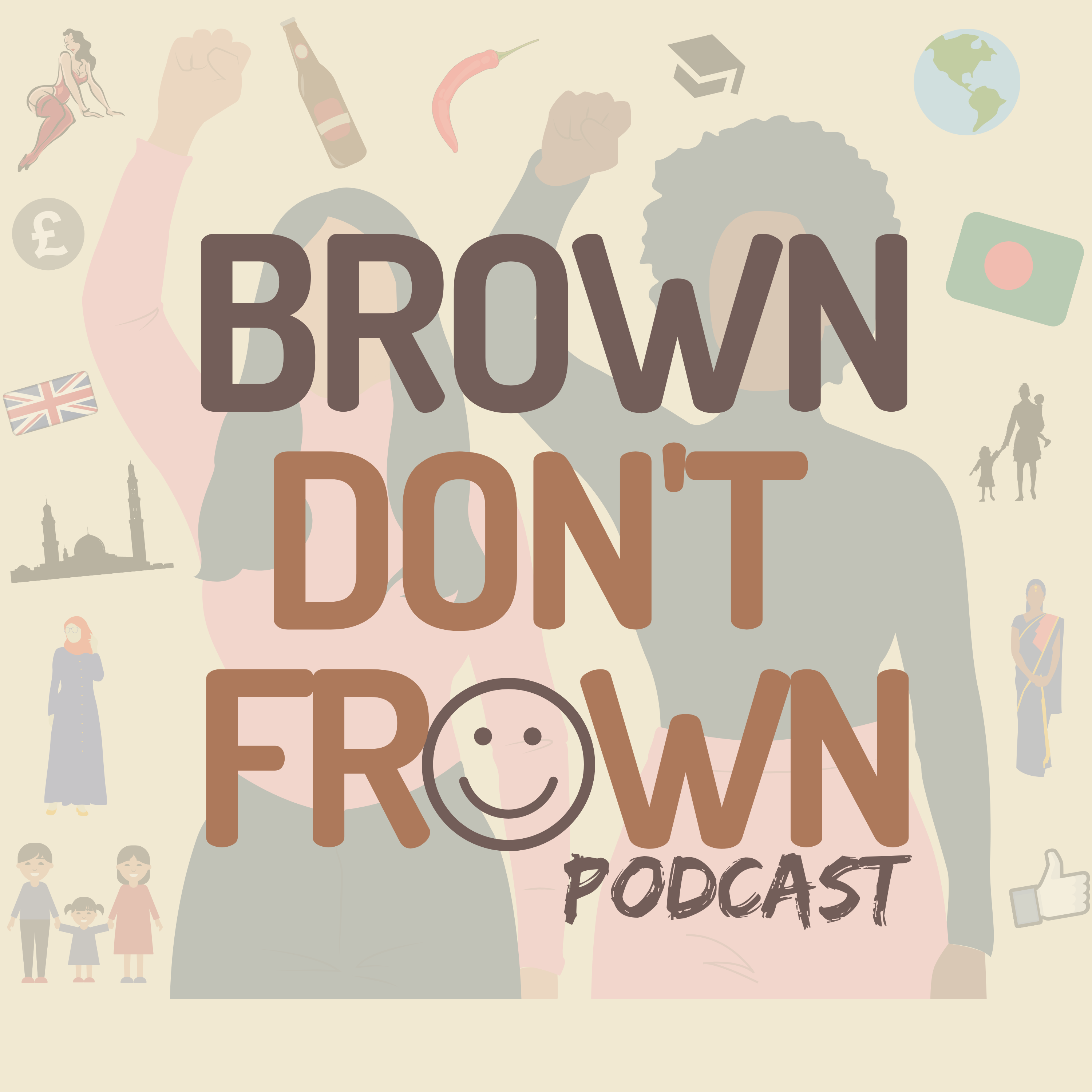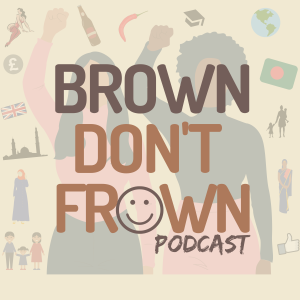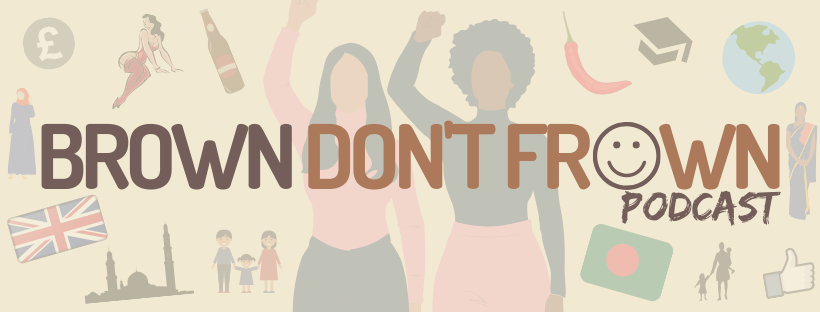
Brown Don't Frown was borne out of a personal journey with womanhood. As a British Bangladeshi, navigating mainstream Feminism often felt exclusionary to me because it didn’t seem to value the experiences or views which shaped my grandmother’s, aunts’, mother’s or friends’ lives. Through this podcast, we seek to build a more inclusive discourse, which breaks down presumptions about different cultures, and shines a positive light on the stories of underrepresented women. Featuring new guest(s) from different walks of life in each episode, Brown Don’t Frown seeks to engage ordinary women and facilitate openness towards entirely new perspectives. It hopes to spark honest and meaningful conversations about intersectional feminist themes in contemporary society with the acknowledgement that our views are shaped by our cultural, racial, religious, social and political experiences. Whether it's discussing society's preconceptions about the Hijab with a British-born Jamaican Muslim woman or examining the impact of gendered expectations on our ability to grieve on our own terms, we hope listeners finish each episode feeling more rounded than they did before. Follow us on: Instagram: https://www.instagram.com/browndontfrownpodcast/ Twitter: https://twitter.com/bdfpodcast?lang=en Facebook: https://www.facebook.com/browndontfrownpodcast LinkedIn: https://www.linkedin.com/company/browndontfrownpodcast
Episodes

Sunday Jun 09, 2024
Sunday Jun 09, 2024
In the final episode of Season 6, I sit down with India Rakusen, a renowned audio and TV producer and presenter. She is best known for her work on BBC's highly acclaimed productions '28ish Days Later', 'Witch', and more recently, 'Child' where India delves into the journey of conception, pregnancy, birth, and the first twelve months of a child's life, exploring the science and history behind our creation.
We discuss the influences of mothering, and the interplay between discipline and affection. India reflects on the image of the Virgin Mary and how it has shaped perceptions of perfectionism and selflessness in motherhood. She also examines the influence of different waves of feminism, from 1970s’ attachment parenting to today's challenges balancing women's independence with mothering. We touch upon childcare, nuclear versus multi-generational families, and the emotional impact of giving and receiving advice.
We also reflect on the bifurcation of medicated and unmedicated birth and the importance of compassion and empathy in recognising that every birth is a unique, special experience. Join us for a discussion that transcends "pregnancy" and "motherhood" and highlights the broader implications for social cohesion, happiness, and economic prosperity.
You can find all episodes of '28ish Days Later', 'Witch' and 'Child' on BBC Sounds or wherever you get your podcasts.
Sign up to our newsletter: https://mailchi.mp/186e92c0ae06/browndontfrownpodcastnewsletter
If you enjoy listening to the podcast, please consider supporting it - all for as little as the price of a coffee! You can donate here: www.patreon.com/browndontfrownpod.
Follow us on:
Twitter - @BDFPodcast
Instagram - @browndontfrownpodcast
LinkedIn - @browndontfrownpodcast

Monday May 27, 2024
Monday May 27, 2024
I sit down with hosts of Two Chickpeas in a Podcast, sisters Nikkita and Natasha to talk about our podcasting journeys, including how we started out, as well as our challenges, successes and future aspirations. We also talk about our experience as second/third generation South Asians - how it has shaped us and our outlooks on life and how it differs from our parents/grandparents, including our confidence in our South Asian identity.
We also cover ambition, creativity and overachievement as a double edged sword. We round off with examining our hopes and dreams over the next decade, such as breaking the mould in terms of parting with some of the traditional expectations set by the generations before us while building acceptance and confidence in ourselves.
You can find Two Chickpeas in a Podcast on Apple, Spotify, TikTok and YouTube. Follow them on Instragram @twochickpeasinapodcast.
Sign up to our newsletter: https://mailchi.mp/186e92c0ae06/browndontfrownpodcastnewsletter
If you enjoy listening to the podcast, please consider supporting it - all for as little as the price of a coffee! You can donate here: www.patreon.com/browndontfrownpod.
Follow us on:
Twitter - @BDFPodcast
Instagram - @browndontfrownpodcast
LinkedIn - @browndontfrownpodcast

Tuesday May 14, 2024
Tuesday May 14, 2024
Neelam founded Cysters in 2015 as a way to challenge some of the misconceptions and stigma around reproductive health, particularly for marginalised and racialised groups. It started off as a Facebook group and has evolved to become a community-led charity which aims to address some of the systemic barriers to better health outcomes.
In this episode, Neelam's fierce dedication to improving reproductive health outcomes alongside her own lived experience come through poignantly as she shares the journey of Cysters, including its challenges and successes, as well as the significance of its core values of community, collaboration, care, and confidence. We also explore taboos in our communities, notably among South Asian women, discussing progress made and hopes for the next generation.
I ask Neelam about Cysters' mobilisation initiatives and outreach campaigns to raise awareness and empower harder to reach communities to speak openly about their health and have a seat at the decision-making table, such as "Chai and Chat" and "Cysters Smear," including its work to influence public health policy.
To join the Cysterhood, visit @cystersgroup on Instagram or www.cysters.org.

Monday Apr 29, 2024
Monday Apr 29, 2024
Mitali Dargani is our next guest. As creator and host of Brown Game Strong, an interview show spotlighting creative South Asian minds, Mitali tells us how the show originated from a place of community support and encouragement, and is an embodiment of lifting each other up. Yet, Brown Game Strong is not just about showing outward success, but equally, recognising the flaws, demons, and challenges we all face.
This was a really enriching discussion in many ways as we uncovered our thought processes in being sandwiched between two mindsets: stability and taking risks, as reflected in our life choices.
As fellow creatives in the storytelling space, we also spend some time reframing how we perceive ‘success’, sharing a sense of conscientiousness about ourselves and the world. We ask - is the need to be constantly productive the antidote to unfulfillment or the antithesis to happiness? Finally, we take an introspective look into how we think our 30s will define us.
Sign up to our newsletter: https://mailchi.mp/186e92c0ae06/browndontfrownpodcastnewsletter
If you enjoy listening to the podcast, please consider supporting it - all for as little as the price of a coffee! You can donate here: www.patreon.com/browndontfrownpod.
Follow us on:
Twitter - @BDFPodcast
Instagram - @browndontfrownpodcast
LinkedIn - @browndontfrownpodcast

Friday Apr 26, 2024
Friday Apr 26, 2024
In this episode, I sit down with an inspirational former colleague and friend, Gabbie Stewart. Gabbie is originally from New Zealand but has spent many years in London with her husband and three young children. We talk about the inevitable juggle of life, personal identity, work, motherhood and everything in between.
We consider the evolution and revolution of pregnancy and motherhood over generations, overcoming myths and fears, alongside convention and personal choices. Working mothers are well acquainted with the term ‘motherhood penalty’ and within this context, Gabbie and I talk about reaching our potential, redefining our own narratives, and reclaiming ourselves while finding ways to enjoy the present and thrive.
Sign up to our newsletter: https://mailchi.mp/186e92c0ae06/browndontfrownpodcastnewsletter
If you enjoy listening to the podcast, please consider supporting it - all for as little as the price of a coffee! You can donate here: www.patreon.com/browndontfrownpod.
Follow us on:
Twitter - @BDFPodcast
Instagram - @browndontfrownpodcast
LinkedIn - @browndontfrownpodcast

Monday Apr 01, 2024
Monday Apr 01, 2024
Seetal Kaur is our next guest. She is Co-Director of Forward Culture, a social initiative focussing on the empowerment of South Asian women. Seetal explains Forward Culture exists not just for finding pride in our South Asian heritage, but also about critically evaluating previous traditions and evolving them in line with our own empowerment and identity.
In this episode, we talk about our shared experience of something that nothing and no one can ever prepare you for: motherhood. We begin with learning from previous generations, examining what has fallen away and what has stood the test of time. We discuss how soul destroying complete selflessness can be and why we shouldn't put it on a pedestal in South Asian cultures in the way that we do. We also explore setting good examples for our children, ‘unlearning’ and ‘reparenting’ and the contrasts between gentle parenting/validating emotions vs authoritative parenting/disciplinarian approaches. Seetal also shares how therapy for her has been a necessary antidote to emotional barriers and improved self-awareness.
Forward Culture offers an enriching Mentorship programme for South Asian women and runs regular workshops, events and research. You can find out more and get involved through www.forwardculture.co or head over to its Instagram @forward.culture.
Sign up to our newsletter: https://mailchi.mp/186e92c0ae06/browndontfrownpodcastnewsletter
If you enjoy listening to the podcast, please consider supporting it - all for as little as the price of a coffee! You can donate here: www.patreon.com/browndontfrownpod.
Follow us on:
Twitter - @BDFPodcast
Instagram - @browndontfrownpodcast
LinkedIn - @browndontfrownpodcast

Sunday Mar 17, 2024
Sunday Mar 17, 2024
The first guest of season 6 is Sairish Hussain, author of ‘The Family Tree’ and ‘Hidden Fires’. Sairish shares her writing journey and the inspirations behind the characters and plots in both of her novels. We also discuss the depiction of negative South Asian and Muslim stereotypes in popular culture and how she has defied these narratives in her stories as well as the importance of authenticity and originality.
Diversity in publishing has been a longstanding and ongoing conversation. We look at Sairish’s experience of navigating the world of publishing and discuss the progress that has been made since the publication of her debut novel in 2020, including what more could be done, moving beyond tokenism and quotas.
Sairish also shares some thoughts and advice for aspiring writers and academics, as well as her future hopes and aspirations.
You can find copies of both of her novels ‘The Family Tree’ and ‘Hidden Fires’ online or in most bookstores.
Sign up to our newsletter: https://mailchi.mp/186e92c0ae06/browndontfrownpodcastnewsletter
If you enjoy listening to the podcast, please consider supporting it, for as little as the price of a coffee! You can donate here: www.patreon.com/browndontfrownpod.
Follow us on:
X - @BDFPodcast
Instagram - @browndontfrownpodcast
LinkedIn - @browndontfrownpodcast

Monday Mar 11, 2024
TRAILER: Season 6
Monday Mar 11, 2024
Monday Mar 11, 2024
Brown Don’t Frown is back again! Season 6 drops March 2024! Make sure you hit the subscribe button and you will be notified as soon as a new episode goes live.
This season is all about empathy and empowerment through various lenses, such as navigating our 30s, not just reaching life goals and milestones but making new ones, parenthood and reproductive health, spinning plates, challenges, fears, surviving, thriving, finding purpose and intention, gratitude, balance, calm, and rest. We’ve got some inspiring women including fellow South Asian podcasters, an acclaimed novelist, a reproductive health campaigner and charity founder, and a co-director of a South Asian women’s empowerment initiative.
Sign up to our newsletter: https://mailchi.mp/186e92c0ae06/browndontfrownpodcastnewsletter
If you enjoy listening to the podcast, please consider supporting it - for as little as the price of a coffee! You can donate here: www.patreon.com/browndontfrownpod.
Follow us on:
X - @BDFPodcast
Instagram - @browndontfrownpodcast
LinkedIn - @browndontfrownpodcast

Wednesday Oct 26, 2022
Wednesday Oct 26, 2022
To mark Black History Month, the final guests of season 5 are Alison Burton and Natalie Duvall, founders of March Muses, which produces luxury gifts representing people of colour and received backing from Dragons’ Den’s Peter Jones and Deborah Meaden. They are the only UK brand to have created a full range of Black Christmas decorations, shining the light on the need for diverse and inclusive figurines and baubles at Christmas time.
Alison and Natalie are single mums who also have full time day jobs and share their perspectives on balancing entrepreneurialism, motherhood and creativity.
It’s important that we raise our children to value diversity, feel visible and see all humans as equal. As mothers of Black daughters, I ask them why representation is particularly important to them.
Natalie and Alison also frankly share their experiences with motherhood:
“As a parent, you’re winging it every day, because you don’t know what you’re going to be faced with and you have to find a solution for it at that moment. You could be tired, you could be hungry, you could be fed up, you could be stressed, but you have to find the answer. And you have to come down to their level with the way that you communicate.”
“The beautiful thing is, you’re always learning from your children…”
You can follow March Muses on Instagram: https://www.instagram.com/marchmuses/ Find out more on https://www.marchmuses.co.uk/
Sign up to our newsletter: https://mailchi.mp/186e92c0ae06/browndontfrownpodcastnewsletter
If you enjoy listening to the podcast, please consider supporting it - all for as little as the price of a coffee! You can donate here: www.patreon.com/browndontfrownpod.
Follow us on:
Twitter - @BDFPodcast
Instagram - @browndontfrownpodcast
Facebook - @browndontfrownpodcast
LinkedIn - @browndontfrownpodcast

Monday Oct 10, 2022
Monday Oct 10, 2022
Katie Pearson is an old classmate from Sixth Form. She talks frankly about life as a stay-at-home mum, the societal stereotypes and stigma associated with it, “mum guilt” and how she manages her anxiety and negative thoughts.
The negative perceptions of stay-at-home mums have been created by women. We are the gatekeepers of this narrative. It often feels like whatever women do, they’re not good enough. If you’re a working mother, you’re neglecting your children, and if you’re a stay-at-home mother, you’ve failed to achieve your full potential. A lot of women calling themselves feminists are part of the problem of this women-shaming. We ask, do we have a problem with internalised misogyny?
Raising children is one of the most undervalued roles in life. Author of Invisible Women, Caroline Criado Perez, says “Women’s unpaid work is work that society depends on, and it is work from which society as a whole benefits[...]The unpaid work that women do isn’t simply a matter of “choice”. It is built into the system we have created – and it could just as easily be built out of it”. ONS analysis of time use data shows that women put in more than double the proportion of unpaid work when it comes to cooking, childcare and housework. I ask Katie whether this resonates with her and she shares her typical day of taking care of her children, and working around the house.
We round off with Katie sharing the best thing about being a mum, the hardest thing and a piece of advice she’d give to expectant or new mothers: be kind to yourself.
Sign up to our newsletter: https://mailchi.mp/186e92c0ae06/browndontfrownpodcastnewsletter
If you enjoy listening to the podcast, please consider supporting it - all for as little as the price of a coffee! You can donate here: www.patreon.com/browndontfrownpod.
Follow us on:
Twitter - @BDFPodcast
Instagram - @browndontfrownpodcast
Facebook - @browndontfrownpodcast
LinkedIn - @browndontfrownpodcast
